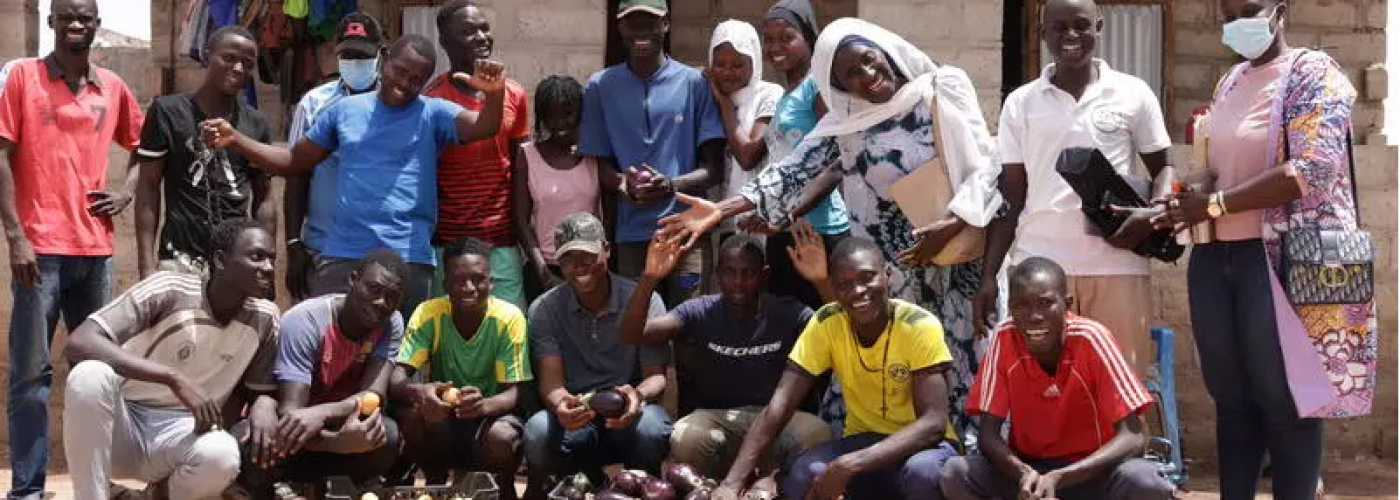Youth Programming Across Contexts: The Journey to Employment
Image

This post is written by Sara Hendery, communications coordinator for the Center for International Research, Education and Development and it part of Marketlinks' and Agrilinks' joint Youth Employment Month. It was originally published on Agrilinks.
In 2019, Ismaila Ba became the leader of Deni Guedj, a youth club in Rufisque, Senegal that specializes in growing and marketing horticulture crops. After just six months, his seven-person team earned $4,700.
In 2020, Tony Sarré and her sister co-founded AM SAMA Style, a fashion company that produces African clothing, accessories and facemasks for men and women. In six months, the two earned $1,000.
While Ba and Sarré have pursued incredibly different industries, their journey to employment is shared — through their involvement with 4-H clubs initiated by Virginia Tech’s Feed the Future Senegal Youth in Agriculture (YIA) project, they built the confidence, connections and character they needed to enter the workforce in Senegal.
Launched in 2017, YIA aims to establish and institutionalize a national Positive Youth Development (PYD) program in Senegal by developing and scaling 4-H throughout the country. 4-H in the United States emphasizes building life skills, relationships and experiential and hands-on learning for youth. For the Senegalese context, YIA works to improve vocational training systems that will lead to entrepreneurship and employment opportunities for youth, focusing especially on agricultural value chains and markets.
Senegal experiences nearly 32% of youth unemployment, a higher rate than many other West African countries. Roughly 60% of all unemployed people in Senegal are under the age of 26. YIA has helped develop 125 youth clubs throughout Senegal — with 561 trained adult leaders and 1,948 enrolled youth — focused on different life skills that could help contribute to gaining or sustaining future employment.
In a recent case study published by the YIA team, the program highlights three clubs that serve as pathways to skills improvement and youth employment in Senegal, all focused on different specializations.
The Best of Us club, for example, focuses on personal development, with youth activities centered on public speaking, self-confidence and teamwork. Young Entrepreneurs at the Heart of Development focuses on community service, with activities including agricultural education for local children, town clean-ups and reforestation. The third club, Club Oignon (Onion Club), leads activities such as gardening, artisanal crafting and live theater on topics like teen pregnancy prevention.
In reviewing the relevance and success of the three clubs, the case study posed a question about the 4-H model in Senegal: What does the 4-H Senegal experience teach us about cultural adaptation of PYD?
“The challenge of cultural adaptation was recognized at the beginning of the YIA program in both the community and institutional approaches,” said Bineta K. Guisse, national director of YIA. “Nevertheless, the essential components and elements of PYD have resonated well with youth and political and academic leaders, and especially with parents. Even though the cultural realities between the West and Africa are often very different, the principles that underlie PYD convey universal building blocks. The voice behind PYD is a message of hope, freedom and ambition for the youth, conflict resolution for leaders and returns of economic growth and peace for communities.”
The case study revealed that many aspects of 4-H and PYD are, in fact, universal. Youth across cultural contexts value life skills, caring adult relationships and experiential and hands-on learning, and possess many of the same life aspirations. Similarly, adult volunteers trained in 4-H across cultural contexts share an appreciation for collaborative training and reflection on the importance of adult education theories as a guiding frame for volunteer development.
But the case study also showed that 4-H Senegal has significantly adapted PYD to the Senegalese context. One major adaptation is emphasis on the importance of pursuing community development actions, especially in agriculture and agribusiness. This further highlights the continued importance of agriculture as a critical element of the Senegalese economy. While this difference does partially compare to the U.S. 4-H “generosity” component, this adaptation intersects with traditional Senegalese cultural norms surrounding service and community solidarity. Additional adaptations include use of local languages and innovative use of information and communication technologies (ICTs), such as WhatsApp. 4-H Senegal programming also emphasizes openness to taking on non-youth participants (such as people living with disabilities), new focal areas (like reproductive health) and new partners.
Questions remain about the proper balance of and interaction between programming that is more focused on life skills or technical entrepreneurship and employment skills, both for 4-H Senegal and globally. While research shows that life skills and PYD may increase the success of youth employment programs, this case study points to a need to further understand this complex dynamic in the case of Senegal, and potentially any country adapting the 4-H model.
Students like Sarré and Ba, however, are a testament to the subtle, but powerful impact of PYD.
“I was very shy at first,” said Sarré, “but thanks to the club’s program and activities, I was able to conquer my fears of speaking in public and express my ideas and innovate.”
The Feed the Future Senegal YIA program is housed at Virginia Tech's Center for International Research, Education and Development.


